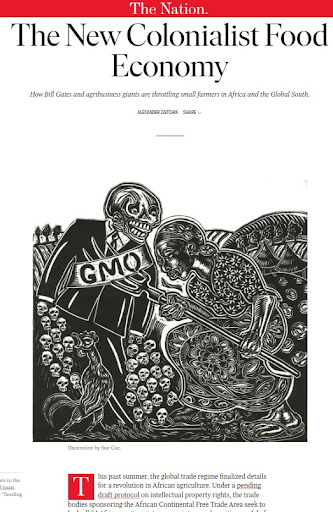
The neocolonial food economy: How Bill Gates and others threaten Africa's agricultural future?
A report on the American “The Nation” website, under the title “The New Colonial Food Economy,” by Alexander Zaitchik, author of the book “Owning the Sun” - A History of the Medical Monopoly, spoke about the consequences of the actions of the global billionaire Bill Gates and other business giants in the areas of food. And agriculture, on small farmers in Africa and the countries of the South.
“Last summer, the global trading system finalized the details of the revolution in African agriculture,” the report stated, explaining that “under the project, the trade bodies sponsoring the African Continental Free Trade Area seek to restrict all 54 African countries to a model “It aims to replace farmers’ traditions and practices, which have persisted on the continent for thousands of years.”
He continued, "The main goal is farmers' human right to seeds and crops, and to share and cultivate them according to personal and societal needs."
"By allowing corporate property rights to replace local seed management, the protocol is the latest front in a global battle over the future of food," he adds.
Based on draft laws written by Western seed companies more than three decades ago in Geneva, the new generation of agricultural reforms seek to impose legal and financial penalties across the African Union on farmers who fail to adopt seeds manufactured abroad and protected by patents, including This includes genetically modified versions of local seeds, according to the report.
The resulting seed economy would turn African agriculture into a bonanza for global agribusiness, foster export-oriented monocultures, and undermine resilience during a period of profound climate disruption.
This new seed economy includes not only major seed and biotechnology companies, but also sponsor governments, in a more complex and controversial effort to re-engineer global agriculture for the benefit of biotechnology and agribusiness, not for the benefit of African farmers or the climate, the report asserts.
The author adds, “Tightening ownership laws on farms across the African Union would represent a major victory for global economic powers, which have spent the past three decades campaigning to undermine farmer-run seed economies and oversee their forced integration into global agribusiness value chains.”
These changes threaten the livelihoods of Africa's small farmers and their collective vital biological heritage, including a number of staple grains, legumes and other crops, which their ancestors developed and protected since the dawn of agriculture.
For farmers who are on the path to a global market drive to standardize and privatize their seeds, the risks are simply preserving their right to economic self-determination.
In a statement to the website, one of the farmers warns: “Companies have changed our food culture... They are now using threats to change our agricultural culture. If we replace traditional seeds with foreign seeds that cannot be replanted, what happens if the new seeds do not arrive? It is an attack on our survival!” .










































